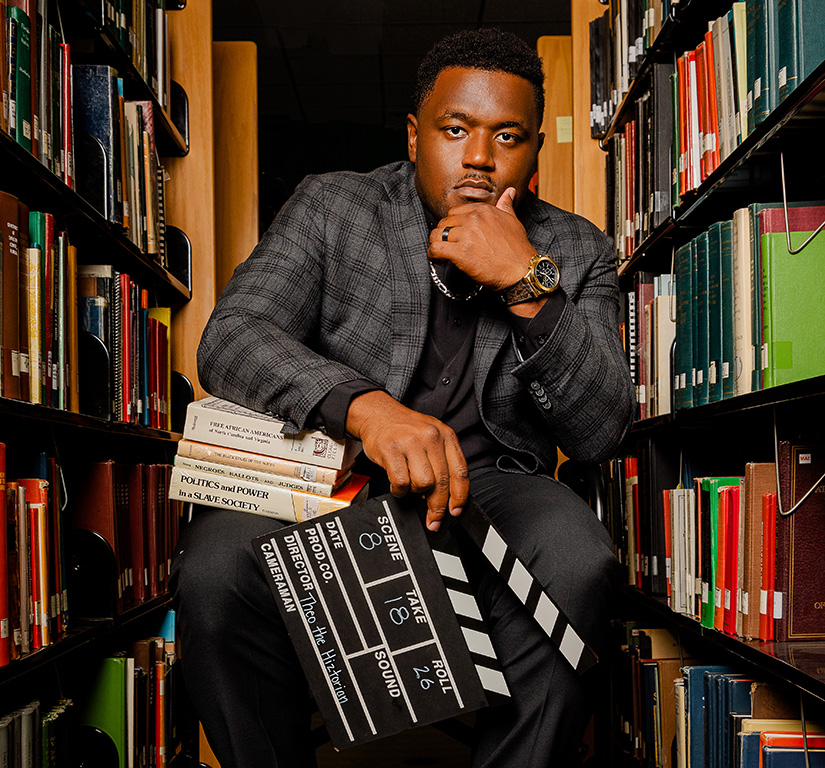BY MADELINE ACOSTA
FOR THE OBSERVER
OPELIKA —
Theo Moore II is both the founder and CEO of Hiztorical Vision Productions, a nonprofit organization where Moore creates documentaries revolving around African American history in Alabama to educate and inspire people — as well as give a voice to the voiceless.
Growing up in Anniston, Alabama, Moore lived in a single-parent household along with his mother and his two sisters. The environment that Moore lived in made him look forward to going to school every day.
“That was my breath of fresh air,” Moore said. “You had teachers that were very positive when speaking to you, and I tried to hold onto that as much as possible.”
Along with his love for education, Moore also loved sports and joining extracurricular activities after school.
“It was basically [to] keep myself from thinking about my home situation,” Moore said.
For college, Moore attended Troy University where he received a bachelor’s degree in history, and then a master’s degree in post-secondary education history.
Moore said he found himself asking the same question: “Why?” When it came to his home environment and the adults and children like him in similar situations, Moore wanted to find the answer. And through history, and educating himself on the past, he said he was able to understand just how much the past influenced the present.
“I was very curious of the fact of my situation,” Moore said. “A lot of kids that I went to school with in my neighborhood was going through the same thing.”
For Moore, another reason he said he wanted to continue his education was because of his teachers when he was younger, and how much of an inspiration they were in his life as well as the lives of his peers.
Moore became a history teacher as a way to help educate and inform his students on these stories and help inspire them. With all his research and work that he had created so far, Moore said he was concerned with how people would see it or gain access to it.
“African American history is not just in your face,” Moore said. “You can’t just find everything you need at the library. Sometimes it takes visiting the communities and talking to people. You may meet one of the elders in the community that has all of the images that you probably need from that time period. From a cultural standpoint, elders hold onto a lot of those memories, and they are their own archives in many different ways.”
To have his research and his works more accessible, Moore sought out a different format of educating: through video.
When it comes to filmmaking, Moore is self-taught. Within his productions, he is the director, writer and producer. Moore oversees every decision made for each project and said he he has seen an improvement within his filmmaking over the years.
“Each project is getting better and better because I’m learning my style; I’m mastering my craft,” Moore said. “If you watch my first film and my latest film, you can see the progression.”
So far, Moore has released three documentaries: “Crown the County of Lowndes,” “Hobson City: From Peril to Promise” and “African By Way Of American.” Moore also has another documentary planned to be released sometime this year.
Since Hiztorical Vision Productions is a nonprofit organization, Moore is able to secure funding to help him with his goals of educating and empowering people through his documentaries. Recently, Moore was announced as the first recipient of the David Brower Grant for Alabama Filmmakers, a $1,500 mentorship that helps Alabama filmmakers during production.
Moore’s wife brought the grant to his attention and encouraged him to apply. Moore was not aware that he won the grant until he saw a post on Instagram announcing him as the winner. When hearing the news that he won the grant, Moore said he was shocked.
“I was like, ‘Oh, I’m the first? OK, no pressure,’” he said.
As Moore progresses in his filmmaking and reaches his goals of educating people on African American history in Alabama, he encourages young adults to broaden their horizons and branch out.
“Don’t put yourself in a box,” Moore said. “Take the first step.”

